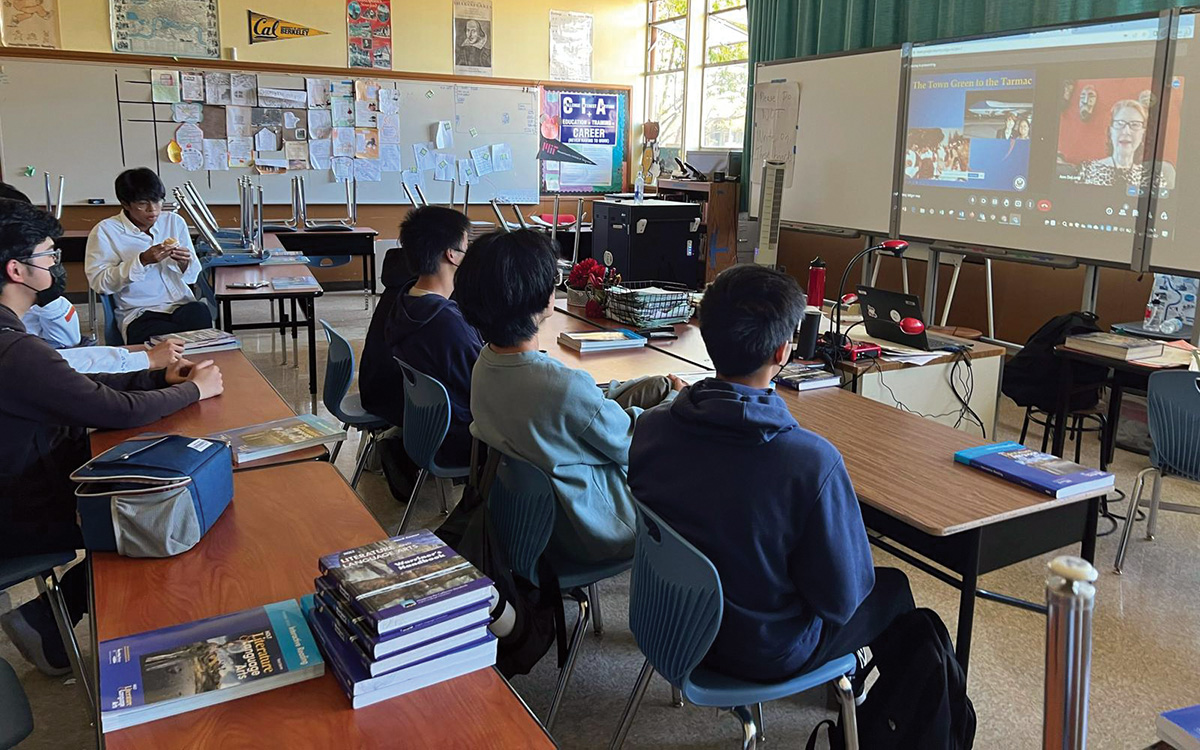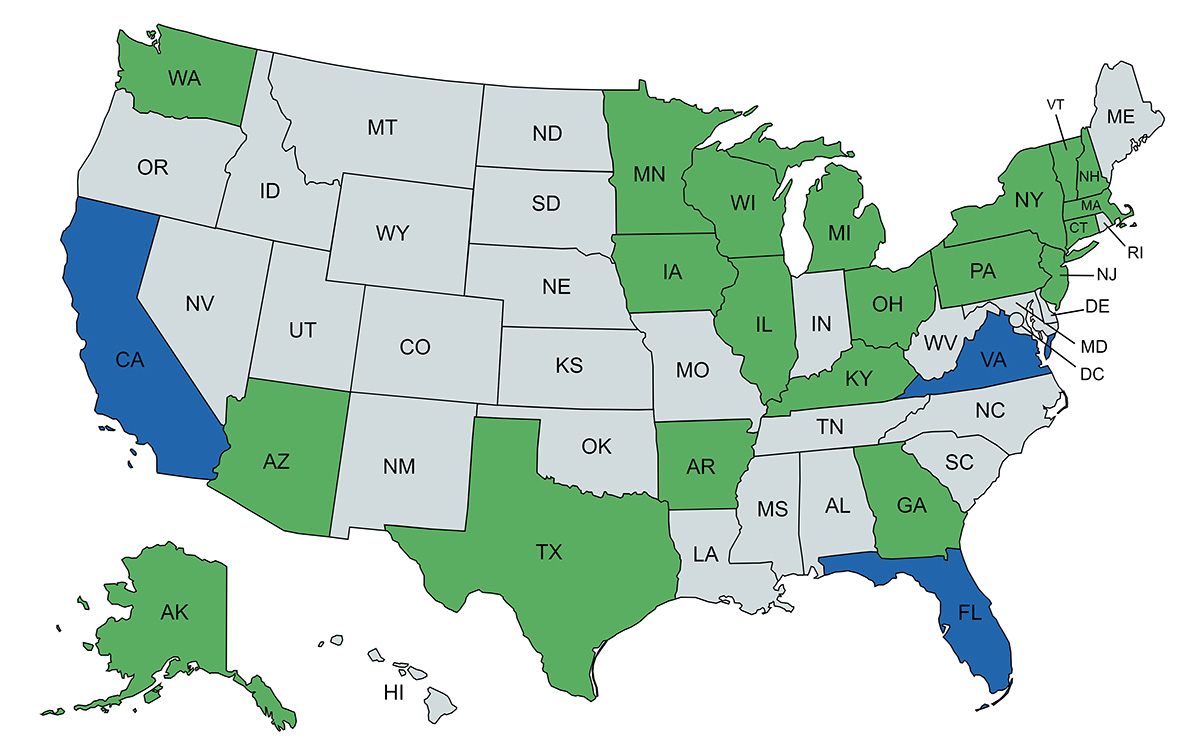The High School Foreign Service Association: Engaging Aspiring Diplomats
This organization for international affairs is giving the U.S. Foreign Service a fresh, new boost among young people.
BY IVAN PANKOV

Students at Arroyo High School in California at their chapter’s first lecture, by Ann E. DeLong about the importance of the Foreign Service, in October 2022. DeLong is a Foreign Service officer and former director of the Family Liaison Office (now the Global Community Liaison Office).
Luis Derla
The High School Foreign Service Association (HSFSA) is celebrating its second anniversary this year. A national organization, it now counts 77 chapters in 21 states, connecting a vibrant community of more than 1,500 aspiring diplomats. In partnership with the American Foreign Service Association, our group has managed to provide a plethora of events, ranging from guest speaker lectures to awareness campaigns, seeking to spread knowledge about the U.S. Foreign Service and offer support to those who dream to join its ranks.
In the Foreign Service’s centennial anniversary year, we remain committed to bolstering the institution’s enduring vitality. HSFSA did not reach its present scale overnight. It started off slowly and required great persistence from all its members, but the remarkable results have vindicated our efforts. Let us delve into the origins of this venture, where a simple idea took root and blossomed into a national movement that is playing a unique role in forging the next generation of American diplomats.
HSFSA’s primary value comes from the guest speakers AFSA helps us find.
In the Beginning
In the summer of 2021, I noticed a gap in the opportunities available to high school students exploring diplomacy as a career field. There were plenty of organizations focused on domestic politics across the country, but, in the case of career exploration of foreign policy, students were relegated to a sparse web of school clubs and programs with unequal access to resources. I was lucky that my school had one, but I knew that something had to be done to improve the national situation. So I decided to start such an organization myself. I reached out to the American Foreign Service Association, pitching a vision of a community that would unite, encourage, and guide future diplomats across the United States from the high school level.
Theo Horn, AFSA's Awards and Scholarships Manager at the time, played an instrumental role in what was to come. “What initially caught my interest in HSFSA was how much it aligned with our outreach goals, and how there was nothing like it in the high school sphere. At the initial pitch meeting with Ivan, I was impressed with his organizational ability and clear vision for what the club could become,” Horn recalls, adding, “Even after that I did not expect how rapidly the club would grow from a few scattered branches to dozens of chapters across the United States.” Together, we worked on developing a framework for the enterprise.
By November 2022, when HSFSA celebrated its first anniversary, we were up to 30 chapters, well beyond our original goal of 10.
With open arms, AFSA agreed to let HSFSA actively work with its Speakers Bureau to procure qualified and motivated lecturers and even offered to send copies of AFSA’s Inside a U.S. Embassy book and monthly Foreign Service Journal to chapters. Resolutely committed to maximizing access, we chose to reject any policy of charging for the nascent organization’s offerings. We named it deliberately to solidify the synergistic bond with AFSA. On Nov. 3, 2021, the High School Foreign Service Association was born.
The first chapter of the organization was founded at my own school, the Gulliver Preparatory School in Miami. The organization began spreading throughout the state. Soon a chapter was created in California; then another appeared in New York. HSFSA had passed the point where it was under threat of collapse; its growth across states and time zones became unstoppable. By November 2022, when HSFSA celebrated its first anniversary, we were up to 30 chapters, well beyond our original goal of 10. They came in all shapes and sizes—some had five members, and others had 50. Our chapters are hosted by schools of all types, public and private, and we especially seek to maximize our outreach to help students in schools with fewer resources.
We strive to bring together as many different perspectives as possible, because an active exchange of and compromise between different ideas is a cornerstone of diplomacy. Every chapter inspires and supports students with a passion for international relations.

The High School Foreign Service Association is active in 21 states. We cherish the diversity of our community, and we are happy that students from Alaska to Florida are passionate about diplomacy and foreign policy. Our superstates—Florida, Virginia, and California, each with more than five chapters—are marked in blue.
HSFSA / maphub.net
Interacting with Diplomats … and Each Other
Fast-forward to the present, the High School Foreign Service Association continues to grow. From Alaska to Georgia, HSFSA has chapters in 21 states and is working to expand in each. The three superstates are Florida, Virginia, and California, each with more than five chapters, and the overall HSFSA community has exceeded 77 schools. Our ranks have expanded to more than 1,500 members.
HSFSA’s primary value comes from the guest speakers AFSA helps us find. We bring career diplomats to high schools to engage with young people interested in foreign affairs. The inaugural lecture took place at the first chapter on Feb. 4, 2022. The speaker was Ambassador Hugo Llorens, a veteran of diplomacy who served as U.S. ambassador to Honduras (2008-2011) and acting ambassador in Afghanistan (2016-2017), among many other senior positions during his 36-year Foreign Service career.
Chapters began organizing “Diplomacy Matters” awareness campaigns, collaborating with other clubs to give presentations about the contributions of diplomats to their topic areas (from cinema to chess).
“I thoroughly enjoyed the opportunity to speak with the students at Gulliver Prep in Miami back in 2022. I found the students well informed and intellectually curious about foreign policy. My goal was to spur the students’ interest in someday considering an international career. Whether in government or the private sector, I wanted them to gain an appreciation of how world events impact our lives in the U.S.,” Llorens reflected in a conversation with me later. He added: “The students were engaged and asked insightful questions. It was a wonderful experience!” With more than 100 students in attendance, the event catalyzed weeks of discussion among my peers.
As more speaker events took place, we began to innovate: we’d bring two chapters together to hear a speaker, transcending geographic boundaries in the quest to share knowledge. Winchester Thurston in Pennsylvania and Sayre School in Kentucky stepped up to be the first. As Alexander Peris, founder of Winchester Thurston’s chapter (and currently HSFSA’s mid-Atlantic regional director), recalls, “The first event was a joint talk, and it gave Winchester Thurston chapter members a unique opportunity. They didn’t learn just from the speaker, a distinguished former diplomat, but from their Sayre School contemporaries, as well. Students came away both well informed about the U.S. Foreign Service, and excited that so many other young people shared their enthusiasm for diplomacy and foreign affairs.”
Expanded Activities
Beyond this, we worked to branch out and provide an even greater variety of resources to our students. We reframed the State Department’s Treaties and Other International Acts Series (TIAS) into an interactive map and Excel database, organizing 2,709 agreements concluded since 1981 into a medium that was easier for research and analysis while also demonstrating the titanic scale of the work put in by the Foreign Service.
HSFSA also created a practice essay contest in collaboration with AFSA. AFSA’s popular annual National High School Essay Contest offers an opportunity for students to demonstrate their skills while writing about diplomacy, as well as a chance to win prizes. We developed the HSFSA Essay Contest to help students prepare for that AFSA competition in a lower-stakes environment. Using prompts from previous years of AFSA’s National High School Essay Contest, HSFSA asked member participants to submit short 500-word essays that would acclimate them to writing on a foreign policy topic. AFSA staff and former AFSA essay contest volunteers pitched in to judge the HSFSA essays; the first-place essay received a $200 prize and the honorable mention a $100 consolation.
We hope to help build a future where diplomacy and diplomats play an even greater role in world affairs.
After the judging, AFSA hosted a webinar for contest participants to receive feedback on their essays and tips on how to best compete in the upcoming AFSA National High School Essay Contest. The first practice essay contest competition, held this year, was a great success, and many students greatly appreciated the tailored feedback they received on their work.
On the chapter level, too, the diversity of activities grew. With support from HSFSA, chapters began organizing “Diplomacy Matters” awareness campaigns, collaborating with other clubs to give presentations about the contributions of diplomats to their topic areas (ranging from cinema to chess). These campaigns exposed thousands of students to how foreign policy affects their own areas of interest. All this was accompanied by regular and insightful discussions of current international events during chapter meetings.
One chapter has stood out. Arroyo High School, a public high school in San Lorenzo, California, earned the title “Chapter of the Year” after conducting three guest speaker lectures and a plethora of other events in the span of a year. As Luis Derla, founder of the chapter and HSFSA Western regional director, said: “My chapter’s success on the West Coast was not without struggle, as we had to deal with issues such as school bureaucracy, logistics, and other frivolous technicalities. Despite this, however, we persisted. We have since become an established debate organization in our school, providing students great opportunities to debate world affairs.” This chapter is a role model for schools around the nation. The founders of the most effective chapters have become members of HSFSA’s Council of Regional Directors, guiding their peers in the different regions.

The interactive map of the Treaties and Other International Acts Series, part of HSFSA’s program to provide a variety of resources to its students, organizes 2,709 agreements entered into since 1981. Available on HSFSA’s website, it visualizes the true scale of diplomacy.
HSFSA / maphub.net
Our Pledge
As founder of the High School Foreign Service Association, I am endlessly grateful for the support that the American Foreign Service Association has provided to HSFSA along its journey. I would also like to extend my heartfelt appreciation to every speaker who took the time to share their wisdom with our students, and I am thankful for the unwavering support and dedication of chapter founders and members. I am confident that our united enthusiasm and work guarantee a bright and long future for HSFSA.
The High School Foreign Service Association is driven by a sense of purpose that extends far beyond the immediate horizon. We hope to help build a future where diplomacy and diplomats play an even greater role in world affairs. In honor of 2024’s grand milestone—both the U.S. Foreign Service’s and AFSA’s celebration of a momentous 100th anniversary—HSFSA pledges to reach 100 chapters. With every chapter established, with every student inspired, we are contributing to a future where diplomacy remains a beacon of hope, bridging divides and forging connections in the pursuit of global harmony. Together, we are forging the next generation of American diplomacy.
When sharing or linking to FSJ articles online, which we welcome and encourage, please be sure to cite the magazine (The Foreign Service Journal) and the month and year of publication. Please check the permissions page for further details.
Read More...
- “All About Internships” by Jacob Borst, The Foreign Service Journal, December 2019
- “Demystifying & Discovering the U.S. Foreign Service” by Mariette A. Boutros, The Foreign Service Journal, December 2019
- “Teaching Diplomacy Today” by Jillian Burns and Mark C. Storella, The Foreign Service Journal, January-February 2020






